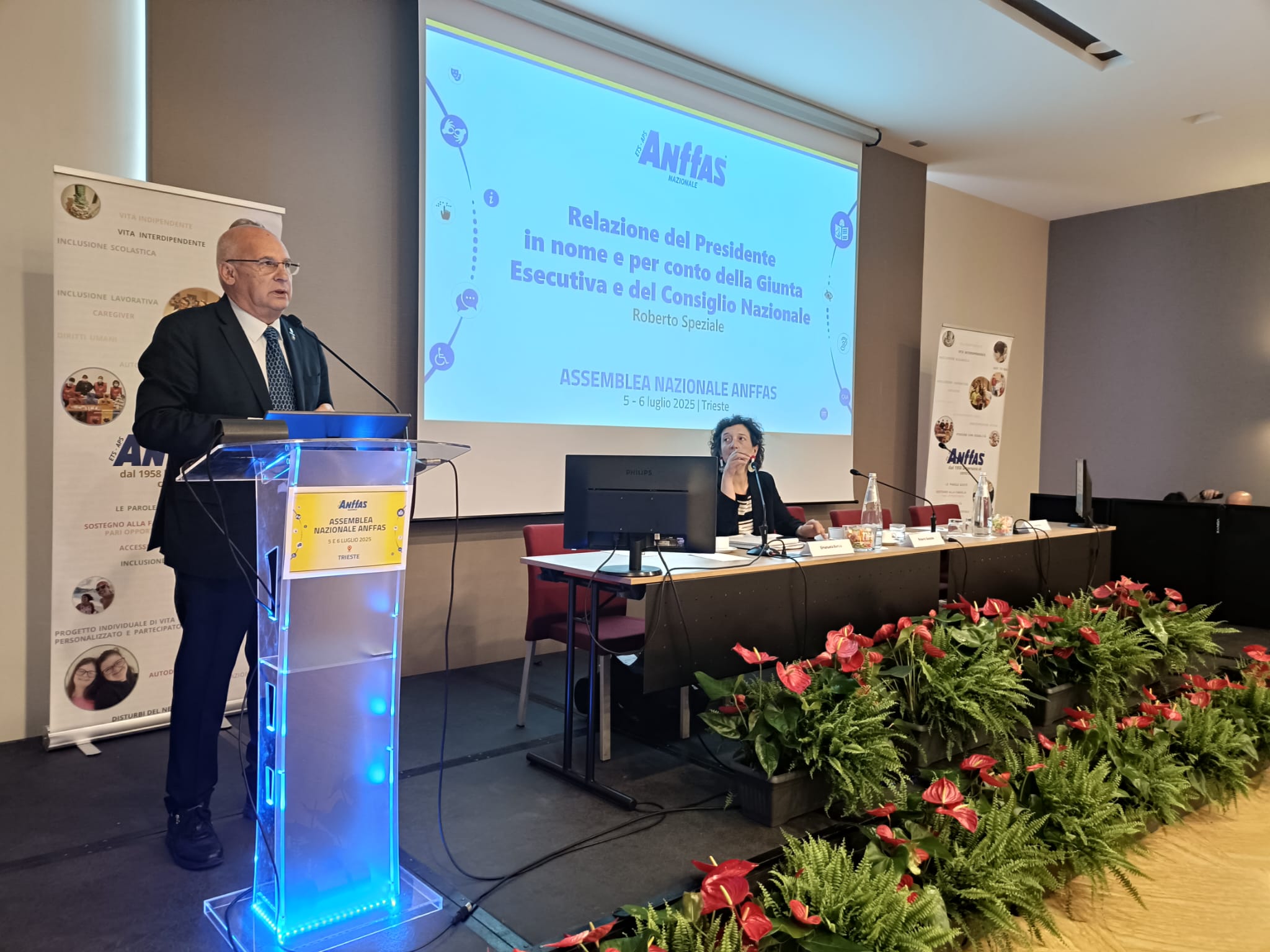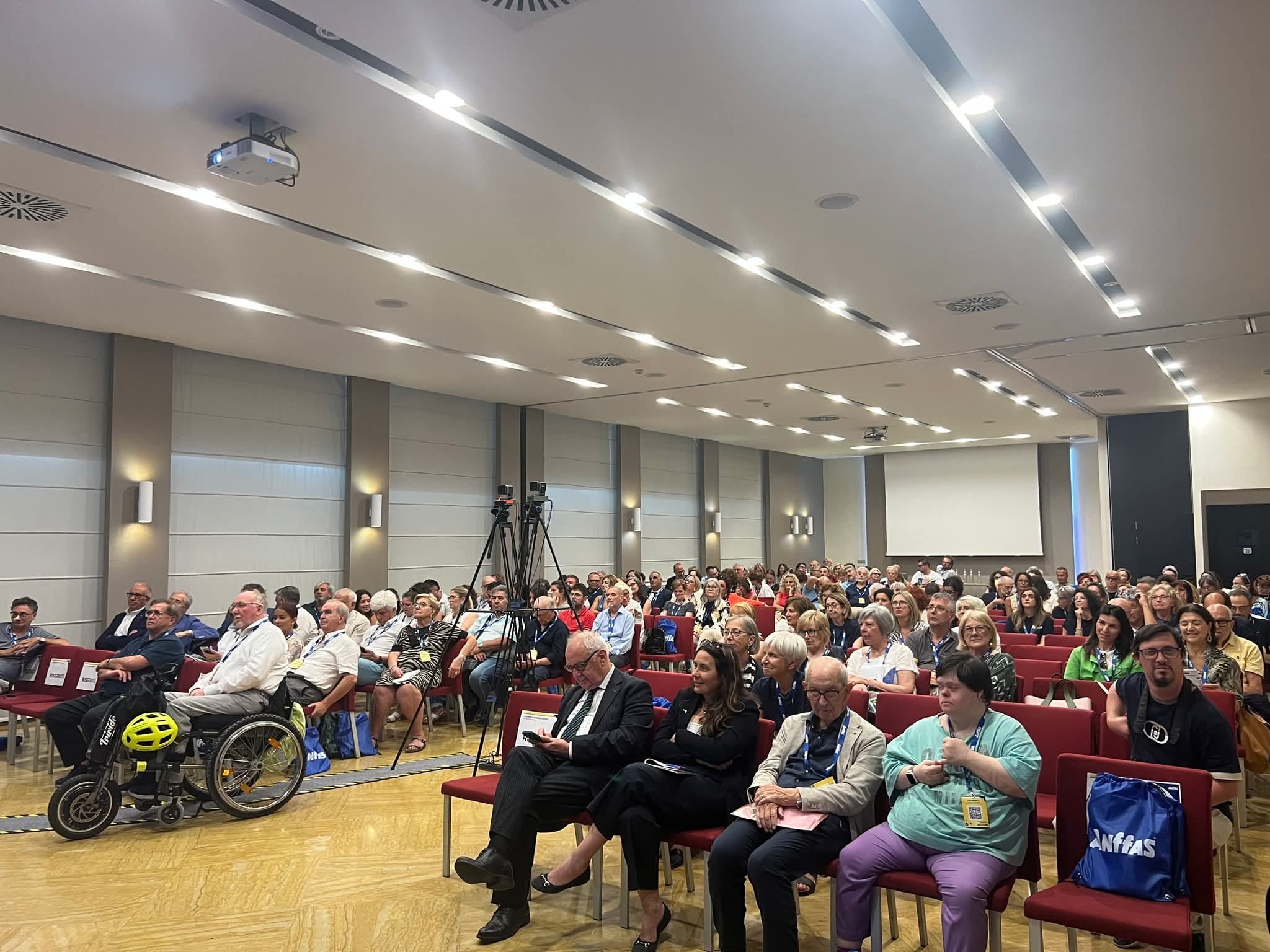Roberto Speziale: «Complex intellectual disabilities: still too many minors excluded from services»

"The Trieste model on disabilities, and more generally that of Friuli Venezia Giulia , should be taken as an example throughout Italy as a good reference practice". This is what Roberto Speziale , president of the National Association of Families and People with Intellectual Disabilities and Neurodevelopmental Disorders – Anffas , claims. The reference is not accidental: Anffas held the works of the national assembly in the Julian capital over the weekend. Speziale ( in the photo below during his speech in Trieste ) draws up a balance of the works.

Mr President, yours was a very well attended meeting.
Yes, we counted over 400 attendees among those who were able to come in person and those who followed us remotely, via streaming. In addition, we had the pleasure of registering high-profile institutional attendees: the Minister for Disabilities, Alessandra Locatelli , spent almost two days with us and wanted to see first-hand the extent of our requests and proposals for improving the good things that have been done in recent times. In addition, the regional councilor for Health, social policies and disability, Riccardo Riccardi , and some representatives of the Trieste City Council were also present. The result was a very interesting cross-section of the social and health policies of that territory, which places that region at cutting-edge levels: it is no coincidence that some time ago they endowed themselves with a law that promotes social and health integration and recognizes the Third Sector as a connecting role.
You talked about the disability reform, implemented with Legislative Decree no. 62/2024.
Yes, it was a good opportunity to take stock together with Minister Locatelli. In some Italian situations, where there are strong institutions and an equally proactive Third Sector, it is possible to activate virtuous processes. This makes us say that, where we do not find similar performances, it is clear why the favorable conditions are not created: there is no regulatory or resource problem, which are often taken because of delays and inefficiencies. It is only a question of infrastructure and activation of virtuous paths that see the Third Sector, as a constitutionally guaranteed subsidiary subject, together with public institutions that have an interest in making active policies to provide answers to social and socio-health issues.
What did Anffas ask of Minister Locatelli?
It was our associates, namely people with intellectual disabilities, who gave her an overview of the situation, who illustrated the most obvious problems, who asked for greater spaces for social and work inclusion. Once again, the theme of the personalized and participatory life project came back forcefully, which is the main tool for guaranteeing dignity, rights and quality of life for people with disabilities. The latter gave the minister a special gift: a copy in “ easy to read ” language (literally, “easy to read”) of the Solfagnano Charter , the document signed by the ministers of the countries that participated in the G7 Inclusion and Disability , held in Umbria in 2024. It is a solemn declaration that commits the seven greats of the planet to support culture and rights. It is a highly symbolic message: the easy to read , certified at European level, allows people with intellectual disabilities to have tools for easier understanding of texts, through augmentative and alternative communication. An absolutely futuristic work, which implements the principle of the UN Convention which is universal accessibility.
Did the minister like the thought?
Yes, to the point that he asked us if it would be possible to make a similar gift to the other members of the government: a sort of plus for cultural advancement, something innovative that you don't receive every day.

What requests have emerged in these two days?
Our members have specifically asked the minister to pay close attention and give priority to the most complex disabilities, that is, those who are invisible. Today, there is a tendency to bring out the heroic vision of disability: the people who make it, the families who make it, the Paralympic champion, the positive cases. But all those extremely complex situations, such as people with serious behavioral problems, create a pressure that is often unsustainable for families and, in most cases, falls on the shoulders of women. In Italy, we count 1.8 million people with disabilities . Obviously, not all of them are highly complex; however, a good 30% of this group falls within the low-functioning autistic spectrum and brings with it a series of very serious problems, such as accentuated aggression. These people, who are often excluded from school and other opportunities, find no dignity or even space in the information channels. Citizens, and I include myself as a parent because it is not right to point the finger, very often prefer not to hear and not to see. Here, a sense of abandonment, sadness, and loneliness prevails in many.
What could politics do?
More resources are needed. I know, it is a request that practically all sectors make, but in this case it is a question of guaranteeing high-quality and high-intensity support. Let me give you an example: if there is a child with serious behavioral problems in a class, that child is usually taken out of the classroom, perhaps into a closet. This happens when a school context does not have adequately prepared and trained figures, who perhaps know the ABA technique ( Applied Behavior Analysis , ed .) and know how to manage complex cases and moments of crisis. If a child displays a certain behavior, he cannot simply be labeled as a rebel: he is showing discomfort. And he communicates to the world, which does not understand him, with the only tools he has. Adequate professionalism is essential but it comes at a cost.
It is a discussion that can be extended to other contexts.
There is no doubt. In recent times we have witnessed an increase in a series of violent and abusive episodes, especially against women and the elderly. If there are no professionals able to take care of people who are not self-sufficient or have highly complex disabilities, it is not possible to manage those cases. I ask myself: are we sure that all the operators of the facilities are adequately trained and have the necessary psychological profile suitable for carrying out such demanding tasks? Our concern is growing because we are witnessing a continuous destructuring of services. Today we have a very long waiting list of children and young people with very serious disabilities who are unable to access public services, such as semi-residential centers that can accommodate them after school activities. And it is up to families to provide, in the meantime, investing thousands of euros a month. But not everyone can afford it.
The public administration is behind in terms of the same sector regulations.
The risk is that families will fall into the hands of people who take economic advantage of them. In short, we did not intervene earlier, we are forced to recover but in the meantime families are breaking up. Most of the time the father figure emerges and the burden falls on the mother's shoulders. The minister has shown great availability and understanding of the issue, but we are aware that this is a difficult time to find financial resources. It is a time in which, rather than promoting unarmed peace, we are promoting armed peace. It is useless for them to tell us that social services will not be cut: social services have already been cut. Even if new investments are not made, the social sector will pay the highest price.
Italy deals with this area in completely different ways from territory to territory.
I look at the excellences, such as Lombardy and Emilia Romagna , but also the aforementioned Friuli Venezia Giulia. It's not that those models cannot be improved, but they are good practices to take as a reference: there is the correct participatory and collaborative relationship between the institutions and the Third Sector. If we want our country to evolve, from the point of view of social policies and welfare, the public administration and the Third Sector entities must evolve in a more osmotic and synergic way, of co-responsibility for the purpose. Then there are regions like Sardinia , which shows elements of great positivity but has not yet made that leap that allows it to get out of the excessively healthcare model to reach a more psychosocial one, possibly increasing collaboration with the Third Sector. Unfortunately, there are other regions that are far behind. The latest data are very clear and disarming: in Calabria social spending is 24 euros per capita, while in Valle d'Aosta it is 386 euros. The results tell us something. Always.
The Third Sector reform has introduced some important innovations, such as the Quality and Self-Control Code. What stage is Anffas at?
Our network has expressed a guideline. Yesterday the assembly approved what I believe is the first Quality Code currently present among the associative networks in Italy. We have equipped ourselves with an ethical, value and behavioral orientation tool that allows us to improve through self-analysis. It is a work of participatory democracy that has involved our base for three years, with periods of training and data collection. The greatest investment of the Third Sector today is its reputation, which must be demonstrated and not self-declared, with elements of accountability and social reporting useful for having a reading of what we do and the social impact we produce.
What can and should Anffas improve?
The assembly approved a document that looks to the next transformation of our Association. We have given ourselves 4-5 years until 2030 to completely restructure our entire network and reorganize ourselves, enhancing our strengths and analyzing our critical issues through a specific action plan. In 67 years, some rust has inevitably accumulated: we must go into the workshop and do some fine-tuning, to grasp and possibly anticipate social complexity. We must relaunch social participation and reinterpret our function to be an adequate entity for carrying out an activity of general interest and pursuit of the common good, a promoter of social cohesion, solidarity and positive peace. We fully embrace the Pope's words: we want a disarmed and disarming peace .
Opening photo Pexels Below, the Quality and Self-Control Code approved by Anffas.
- Tags:
- Rights
- Disability
- Family
- Work
- third sector
With an annual subscription you can browse more than 50 issues of our magazine, from January 2020 to today: each issue a story that is always current. In addition to all the extra content such as thematic newsletters, podcasts, infographics and insights.
Vita.it




